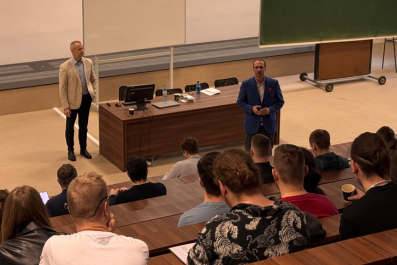The study programme of Process Automation and Informatization supersedes the outcomes of education reached throughout the course of a graduate’s previous studies. The aim is to strengthen and increase a graduate’s accomplishments and enhance preobtained knowledge appertaining to their scientific advances in the field of automated and automatic control systems, information systems and technologies, problem solving associated with complex systems development, in experimental preparation and control with the help of systems modelling, systems simulation and optimization, problem and integration methods of information and control systems of all levels, methods and techniques of knowledge acquisition for hierarchical control systems. A graduate procures extensive understanding of intelligent control methods and the concept of Industry 4.0 including the constituent parts of its framework.
This study programme provides further preparation necessary for independent task-solving in numerous branches of automation (advanced methods of systems theory for automation control, methods of intelligent control, automata theory, principles of designing automated and automatic systems alongside their security information and event management).
The study programme cultivates the graduate enough for him or her to comprehend scientific research and development methods of given automation problems alongside the use of information technologies of data acquisition, transfer, and storage, inclusive of information processing.
The system of semi-compulsory courses within the 1st and 2nd semester allows the student to choose amongst three fundamental pillars of automation (complex system control, intelligent control systems, smart manufacturing methods) the graduate can concentrate his or her activities and interest on during the advances of his or her studies.
A graduate is ready to carry out scientific and research-related workload in the sphere of research and development, with concentration toward the development of new and organized methods and techniques of control theory in complex control systems, stemming from the insights on algorithms at each and every level of system control. They are prepared to formulate complications and nodi, leading a team comprising professionals for counter-response.
A graduate is cognizant of societal, moral, legal, and economic connections of their profession on the post of a scientific or research worker.
STUDY PROGRAMME features and objective
Attained knowledge base
- A graduate displays his or her profound comprehension of automated and automatic control systems in tandem with their understanding of information systems and technologies.
- He or she follows topics concerning complex system theory and those of complex automation processes.
- He or she is able to design and model complex control and information systems in addition to their skills within the areas of creating simulations and optimalization and process control.
- Recognises methods of efficient learning for the needs of control and hierarchical process operation.
- A graduate enacts intelligent methods of control. They consciously determine a methods’ purposefulness and know associated techniques, procedures, and tools.
- He or she constructively identifies specific levels of control and defines vertical and horizontal data integration.
- A graduate confirms the appearance and functionalities of the information security in control systems.
- They reveal a vast repository of aggregated details about natural sciences.
- He or she immediately takes apposite corrective measures when evaluating any deviations detrimental to security-sensitive situations.
- A graduate perceives the significance of Industry 4.0 and the core elements of its framework.
- They present themselves with prowess within the necessary scope of academic English subsets chiefly intended for technology and science.
Key learning outcomes
- Employing his or her accumulated intellectual resources, a graduate designs and programs complex distributed systems, hierarchical information, and control systems, exercising his or her erudition regarding algorithms and methods of software engineering.
- They arrange a set of devices and governing software in a tree in order to form a hierarchical control system.
- He or she defines approaches and tools for preparation and control of experiments, engaging modelling, simulation, and optimization.
- A graduate has the ability of independent theory, procedure, and tool installation, subsequent to their application, while building systems of automated control used to command technological and manufacturing processes, and information systems.
- He or she analyses and assesses the worth of solutions based on information and communication technologies as well as design, implementation, management, and the utilization of manufacturing and automated control systems.
- A graduate proves to be capable of sizing up techniques of fuzzy logic, machine and reinforcement learning, genetic algorithms and programming, evolutionary computation, and neural networks – inclusive of their quality of being appropriate of intelligent control.
- He or she recognizes software tools and consciously puts computing approaches of intelligent control into effect.
General competencies
- A graduate brings research and development methods into practice on the subject of specific problems in automatization and informatization.
- He or she is ready to take a scientific or research-oriented steps forth in respect of their career.
- A graduate adroitly articulates and confidently addresses unwelcomed matters.
- They apply analytical thinking strategies and present their opinions and solutions in a self-assured mien.
- He or she meets the standards of collaboration in a group setting and, putting team management theories into practice, deftly leads teams.
- They evince the ability to improve all qualifications gained up to a given point in time and educate themselves further individually as well as in organised learning groups and courses.
- A graduate is aware of societal, moral, legal, economic, and ecological implications of their solutions.
- They prove to be linguistically well-equipped to a required extent.
Labour market demand and CAREER PROSPECTs
Professional paths and occupational outlook
A graduate becomes a versatile professional who meets the satisfactory needs of many positions in research-based, scientific, technical, and training-focused organisations – bypassing questions of whether the supply and demand are linked to domestic or international labour market, as well as in the industry on the developmental and directorial posts.
Several absolvents of the doctoral study in the given study programme remain in the academic department and pursue postgraduate education of higher qualification – Doctoral or Professorial academic ranks. Many find employment not only in the Slovak Republic, but also in companies and research institutions abroad as executive, administration, design, management, and research workers of industry.
By way of illustration, and with regard to statistical data, multitude of the graduates operate within executive functions in research and development centres in BMW Munich, Leibniz-Institut für Festkörper- und Werkstoffforschung Drážďany, Hewlett-Packard Slovakia, VUJE a.s. etc.
On the report of The Ministry of Labour, Social Affairs and Family of the Slovak Republic project, sustavapovolani.sk, a person who has successfully completed the course of study can seek positions of employment as a: ICT project manager, ICT business analyst, ICT services and solutions manager, ICT process specialist, CIO, software developer, software solution designer, research and development manager, data analyst, data scientist, big data expert.
Academic supervisor: prof. Ing. Pavol Tanuška, PhD., pavol.tanuska@stuba.sk
Educational consultant:doc. Ing. Martin Juhás, PhD., martin_juhas@stuba.sk


